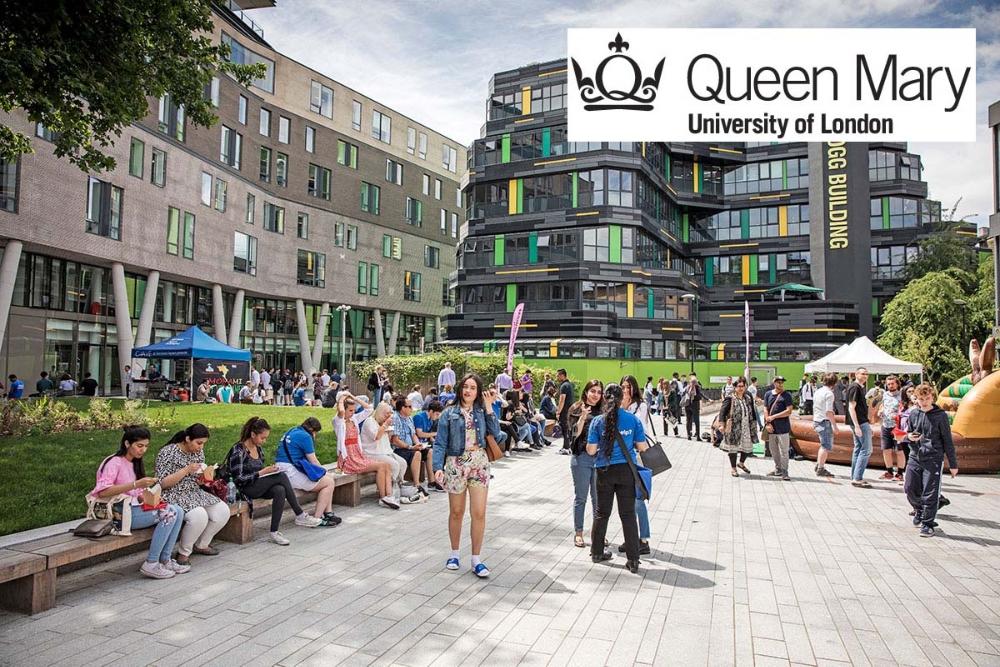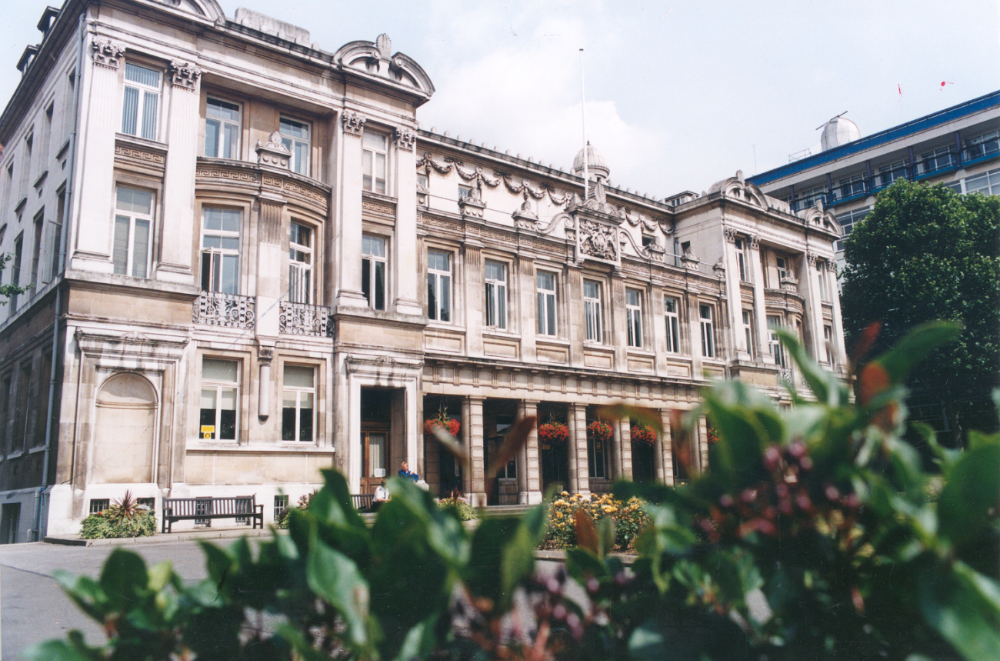Students interested in studying abroad at Queen Mary for the Spring 2024 term
should visit the ULondon brochure page and apply. |

Introduction:
The capital of the United Kingdom, London is a major international city - one of the world's leading commercial, financial, cultural, and communication centers. A lively mix of the ancient and modern, London is a city that offers something for everyone, including theater, shopping, museums, politics, and nightlife.
With 6,000 students and over 500 teaching and research staff, Queen Mary is one of the largest of the colleges that make up the federal University of London, a conglomerate of schools and colleges that form the largest and most diverse university in Britain. Its campus is conveniently located in the heart of London's East End on Mile End Road. The surrounding community is bustling with street markets, riverside pubs, parks, theaters, and art galleries. The campus is self-contained, with academic departments, library, student union, and administrative buildings on one
campus.
Disclaimer:
Due to the continued impact of COVID-19, applicants should be aware that changes to academic calendars may occur with little or no notice. Students are encouraged to either wait to book travel or book travel that allows for changes with no financial penalty.
Applicants should also be aware that processing of visas may be impacted or halted by specific countries. Failure to secure the necessary visa may result in inability to participate in this program.
Participants on this program may be required to self-quarantine prior to the start of their program for a specified period of time. Students are responsible for arranging (logistics and financial) their travel appropriately to ensure self-quarantine is completed prior to the start of the program.
ATTENTION: Students interested in applying for Queen Mary University of London
must have a serious second choice. Exchange places for this program are limited. If you are not selected, you will be considered for your second-choice program instead.
Academics:
Queen Mary, University of London (QMUL) is a member of the UK’s Russell Group which includes Oxford, Cambridge, University College London, King's College London, and Imperial College London. QMUL maintains high-quality research and a focus on the student experience. QMU has over 13,000 students enrolled on campus; approximately 20 percent of them come from outside the UK and represent over 100 countries. As a result, QMUL has a vibrant international student community. You can take courses in a wide variety of subjects, but QMUL has particular academic strengths in English, Drama, History, Political Science and Biological Sciences. Some subjects have restrictions for visiting students, which you can view on the QMUL website. Only courses on the directory which have a "Yes" in the column for “Associates” are available to visiting students. You will take classes alongside full-degree local students.
Full-degree British students traditionally study only one subject during their undergraduate career. As a visiting student, you are allowed to take courses in more than one department, but you must meet course prerequisites. Know than timetable conflicts can occur when looking at courses in different departments.
Education System:

The academic system in the U.K. is quite different from that of the United States but like the U.S. system, remember that teaching and assessment methods may vary from course to course. Generally, you will find that you have fewer “contact” hours - time spent in class - in your courses at Queen Mary than you normally do here. You will find that you are left with a significant amount of time during the day and also in the evening when you do not have to attend classes, but no clear indication of how this time must be spent. This does not mean that your course load is lighter; rather, you are expected to spend more time in self-directed study preparing for classes, papers, and examinations. To succeed in your studies, you will have to develop a work routine where this “free time” is used productively.
Grading System and Credit Conversion:
| QM Mark |
UM Grade |
| 70-100 |
A |
| 65-69 |
A- |
| 60-64 |
B+ |
| 50-59 |
B |
| 45-49 |
C+ |
| 40-44 |
C |
| 0-39 |
F |
Queen Mary Credit Equivalency: each QM course of 15 credits = 3.75 UM credits
(QM credits divided by 4 = UM credits)
Academic Areas:
Arts and Humanities
Social Sciences
Natural Sciences
*Psychology courses are extremely limited to exchange students*
Extracurricular: The Queen Mary Students' Union Volunteering Service has hundreds of opportunities for students looking to incorporate an element of community/social engagement while in London.
Volunteering is a great way to meet new people and allows you to explore London in a unique way (while helping build your resume at the same time). QMUL also has an extremely active
sport and
society network that will feel similar to Miami's offerings!
Prerequisites:
Minimum 3.0 GPA. Please note that this is a competitive program due to interest in London.
Accommodation & Meals:
Self-catering residences, where students cook for themselves, are available on campus or within walking distance from the college. The accommodations office offers advice and assistance to the significant population of students who choose to live in privately owned flats.
QMUL recommends that students opt for on-campus accommodation. Once you are accepted by Queen Mary, they will send detailed housing information and an application link to the online form. You are strongly encouraged to complete this online form as soon as possible to have the best chance of getting your choice of housing.
There are three types of housing available at QM: Catered Residences, where breakfast and dinner are provided daily; Part Catered Residences, which offer breakfast only; Self Catering Residence, where students cook for themselves. The most predominant form of housing, self-catering residences typically offer a single room in a shared “flat” (apartment).
You Are A Guest:
As an exchange student, you will have the opportunity to experience university life in a completely different way. For example, you might find that courses abroad are not equal to three UM credits. The format of assessment might be different, with great emphasis being placed on one big test versus smaller assignments throughout the semester. The amount of time spent in class can vary greatly from country to country as well as the amount of independent learning that is expected. Exchange students are guests of the host university and will not receive any services that the local, degree-seeking students do not receive. The university abroad may not provide the same amenities as the University of Miami and the level of customer service can vary.
Exchange programs open the door for students to have the experience of a university student in a different country. It is important to talk to your study abroad advisor about your level of comfort with the challenges that await you abroad. Your advisor may be able to suggest an exchange program that offers more of the services to which you have become accustomed, or can direct you to a semester on location program. Students who have chosen to embark on an exchange program have reported that by overcoming obstacles encountered abroad, they have gained independence and self-confidence, and were challenged to broaden their perspectives.
Dates:
Fall: Mid-September to mid-December
Spring: Mid-January to early June
Student testimonial:
"I loved being in a big city, but also having a campus. I became part of a community that gave me an an escape from the hustle and bustle city. Another thing that I loved was living with a diverse group of students. Study abroad students are housed with regular Queen Mary students who come from the UK and beyond. I now have friends throughout Europe!" - Brooke Kaplan
"Studying abroad was, unsurprisingly, one of the best experiences of my life. Having the opportunity in London to experience such a wealth of culture in a fast-paced, international hub, as well as having the chance to travel to at least 10 other countries throughout my semester, I found within myself a resilience that I did not know I had. I developed patience for long train rides and adjusting to new surroundings; I honed problem-solving skills from having to deal with a variety of travel mishaps. Moreover, studying abroad made me reflect time and time again about what I want from my life and how I want to make my mark in this world. I'm so grateful to have had the good fortune to take on this experience, and I recommend it for anyone. If you take advantage of it, it is truly life-changing." - Chelsea Cook
